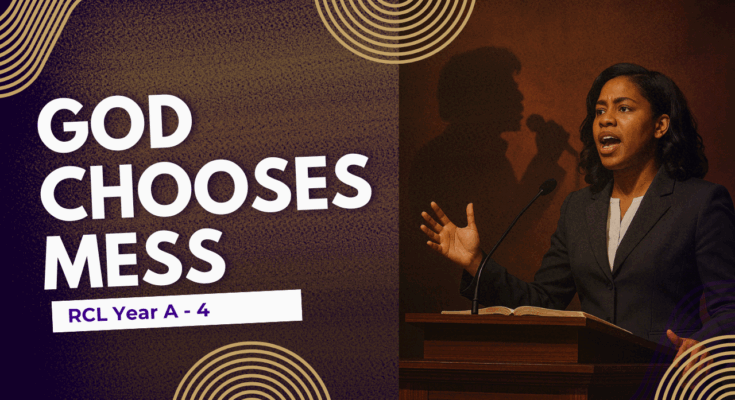As an Amazon Associate I earn from qualifying purchases.
Text: Matthew 1:18–25
Season: Advent IV
Introduction — Advent Means God Steps Into It
Advent is the most honest season of the church year. Christmas, the world can handle: lights, carols, gift wrap, clean mangers with porcelain shepherds who never smell like sheep. But Advent? Advent is waiting. Advent is groaning. Advent is living with the lights off while you keep striking matches against the dark.
Every week in Advent we light one more candle: hope, peace, joy, love. Not because the world is suddenly better but because we refuse to stop expecting God. Advent is not for the sentimental; Advent is for the survivors. Advent is the discipline of a people who look at a broken world and still dare to prepare Him room.
And what does Advent tell us? That when God shows up, He does not arrive through sanitized channels. He does not wait for perfect families or respectable reputations. He does not hold His nose until the air clears. Advent says that God steps into the dirt, into the confusion, into the scandal, into the shame. Advent says God takes mess.
James Brown once sang, “Papa don’t take no mess.” That’s some folks’ daddy: if things get complicated, Papa walks out. If scandal knocks, Papa hides. If it’s too messy, Papa doesn’t want to deal with it. But the gospel flips the record: our God takes mess. He doesn’t deny it. He doesn’t dodge it. He doesn’t run from it. He takes it, He chooses it, He uses it, and He redeems it.
That’s the theme this morning: God takes mess. Say it with me. God takes mess.
I. God Takes Messy Family Trees
Before Matthew gives us a manger, he gives us a genealogy (Matthew 1:1–17). Forty-two names. Most of us skim it. But slow down and you’ll hear the sound of the blues humming under every branch. This is not a marble hall of saints; this is a porch full of survivors.
Consider the women Matthew highlights — women you might not expect in the “holy” family tree.
-
Tamar (Genesis 38). A woman cheated by her in-laws, ignored by the men who owed her justice. Left with no recourse, she tricked her father-in-law into keeping his word. Messy? Absolutely. Yet Matthew refuses to erase her. God refuses to disqualify her. Tamar’s name stands in the line of Messiah.
-
Rahab (Joshua 2). A Canaanite woman whose label followed her: prostitute. Every introduction carried the scar. Yet when Israel’s spies came to town, she hid them. She trusted their God. And generations later, Hebrews 11 calls her a hero of faith. Rahab’s mess didn’t block her blessing; God took it and used it.
-
Ruth (Ruth 1–4). A Moabite widow. Foreign. Poor. She clung to Naomi with nothing but loyalty: “Where you go, I will go.” She gleaned crumbs from the field — and God turned that field into her inheritance. She became the great-grandmother of David. From poverty to promise. From outsider to inside the line of Jesus.
-
Bathsheba (2 Samuel 11). Matthew doesn’t even name her outright; he calls her “the wife of Uriah” so we never forget David’s sin. Bathsheba carried trauma in her body and shame in her reputation. Yet God did not redact her story. He let the scar remain visible in salvation’s genealogy.
What do these names teach us? That God is not allergic to scandal. That the Savior of the world is born from a family album with coffee stains, torn corners, and photos you’d rather leave in the box. God doesn’t sanitize the story. He lets it sing in a blue key.
You hear the refrain, don’t you? It’s the Williams Brothers singing: “I’m still here.” Tamar — still here. Rahab — still here. Ruth — still here. Bathsheba — still here. You — still here.
And what about your family tree? You’ve got names you whisper. Stories you don’t bring up in daylight. Maybe a cousin locked up, a parent lost to addiction, a grandparent who disappeared, a child you can’t talk about without tears. The family tree bends under the weight of secrets. But Advent says: God takes mess. Your bloodline doesn’t disqualify you. Christ’s bloodline redeems you.
Some of us feel the shame of family history like a tattoo on the skin — it shows up whether you want it to or not. Some of us were told, “You’ll never be different from your daddy” or “You’ve got your mama’s temper” or “That’s just how our people are.” Advent says: God knows your story, and He steps into it anyway. Jesus isn’t embarrassed by His people; He claims them. And He claims you.
Think about it: If Jesus came through Tamar’s desperation, Rahab’s label, Ruth’s poverty, Bathsheba’s scandal, then He can come through your family too. If He can hang on a tree made of broken branches, then He can hang with your family. Advent says: God takes mess.
II. God Takes Messy Situations
Verse 18: “Now the birth of Jesus the Messiah took place in this way. When his mother Mary had been engaged to Joseph, but before they lived together, she was found to be with child from the Holy Spirit.”
Don’t rush past that line. Let it breathe. Mary is pregnant. Joseph is not the father. In a culture where honor was everything, this isn’t just awkward — it’s dangerous. In Deuteronomy’s law code, a woman found pregnant outside of marriage could face stoning. At the very least, she would carry a brand of shame for the rest of her life.
Joseph knows the child is not his. And Matthew says Joseph was a “righteous man.” That means he cared about God’s law and his community’s honor. But righteousness doesn’t protect him from heartbreak. Righteousness doesn’t stop the rumors. Righteousness doesn’t tell him what to do when the woman he loves is suddenly carrying a child he didn’t father.
Joseph resolves to “dismiss her quietly.” That’s his plan. He chooses mercy over vengeance, discretion over scandal. Maybe he thought he was doing Mary a favor. But let’s be honest: it was also self-preservation. He was trying to escape the mess with minimal damage.
But here’s the gospel turn: what Joseph called scandal, God called salvation. What Joseph labeled shame, God named holy. Joseph needed a dream to see it. “Joseph, son of David, do not be afraid to take Mary as your wife, for the child conceived in her is from the Holy Spirit.”
This is Advent’s blues note: God bends the situation. Like a blues guitarist who leans into the string, dragging it just out of tune until it wails true, God takes a situation that sounds all wrong and bends it into the key of salvation.
Think about Mary. A teenage girl carrying the weight of whispers she can’t outrun. Every glance feels like an accusation. Every errand feels like a walk of shame. She could have sung the old spiritual: “Sometimes I feel like a motherless child, a long way from home.”
Think about Joseph. A man caught between law and love, lying awake at night, staring at the ceiling, praying for a way out. His sigh matches the song: “Nobody knows the trouble I’ve seen, nobody knows but Jesus.”
Together they could have moaned: “It’s me, it’s me, it’s me, O Lord, standing in the need of prayer.”
Advent doesn’t silence that moan. Advent sanctifies it. Advent says God enters it.
And it’s not just their story. It’s ours.
-
Somebody here gave fifteen faithful years to a company. You showed up early, stayed late, kept the place running. Then one Friday, HR calls you in for a “quick meeting.” Ten minutes later you’re walking out with a cardboard box. That’s a mess. And Advent says: God takes mess.
-
Somebody stood at an altar and said, “For better or worse.” You meant it. You tried. But now you find yourself signing papers you never wanted to sign. That’s a mess. And Advent says: God takes mess.
-
Somebody’s refrigerator hums while the pantry is bare. You tithe faithfully, you stretch every dollar, and still the rent notice lands on your door like a judge’s gavel. That’s a mess. And Advent says: God takes mess.
-
Somebody raised children with love, with prayer, with discipline, with faith. You did the best you knew. And now that child looks at you like a stranger, cuts you out of their life, blames you for wounds you can’t even name. That’s a mess. And Advent says: God takes mess.
Here’s the thing: We often think God waits until we get our act together. We think God is on the other side of our mess saying, “Clean up, and then I’ll come.” But Advent tells the truth: God shows up right in the middle of the mess. Before Joseph could work out his plan. Before Mary could clear her name. Before the neighbors stopped whispering. God was already there.
That’s why Shirley Caesar’s gospel refrain preaches so well: “God will make a way.” She never said God will make it easy. She never said God will make it clean. She said God will make a way — a path through the scandal, a road through the shame, a door through the locked room.
And let me remind you: Advent is not about decorating the story; it’s about inhabiting it. Advent is God stepping into a messy situation, bending the note until it cries out holy. Advent is God saying, “I take it.”
So when you look at your own life and all you see is contradiction — promises God gave you on one hand, circumstances that laugh in your face on the other — remember Joseph’s dream. Remember Mary’s scandal. Remember the whisper turned into worship. Advent says God takes messy situations.
III. God Takes Messy Classes
Luke tells us that when Mary and Joseph came to dedicate Jesus at the temple, they brought two pigeons (Luke 2:24). Not a lamb. Not the offering of the middle or upper class. They brought the sacrifice of the poor. Right there, the gospel locates itself: in a household that couldn’t afford more than pigeons.
The Savior of the world was not born into power. He was not born into wealth. He was not born into respectability. He was born into a family that lived on the margins, in a town people ridiculed, under an empire that crushed.
Jesus grew up in Nazareth — a place so disrespected that when Nathanael heard about Him, he scoffed: “Can anything good come out of Nazareth?” (John 1:46). That wasn’t just a question; it was an insult. Nazareth was shorthand for “nowhere.” The kind of place you don’t admit you’re from when you’re applying for the job. The kind of place people drive past but never stop in.
But here’s the gospel turn: Heaven’s answer to Nathanael’s insult was Jesus. Can anything good come out of Nazareth? Yes — salvation itself.
Advent tells us God is not embarrassed to be poor. God is not ashamed to be from the “wrong side of the tracks.” God is not intimidated by the judgment of people who equate worth with wealth. God takes class mess.
This is why Stevie Wonder’s song belongs in Advent’s soundtrack: “Heaven help us all.” The cry of the poor. The cry of the single mother stretching groceries across two weeks. The cry of the grandfather standing in line at the free clinic. The cry of the teenager working two jobs and still falling behind. Heaven help us all. And Advent says: Heaven has.
The blues was born this way too. It didn’t come out of gilded theaters but out of cotton fields and shotgun houses. The blues rose up from voices bent by labor, from bodies tired and unpaid, from lives that scraped survival out of the dirt. Out of lack came a music that said, “We are still here.” Out of poverty came a sound that carried hope.
That’s Advent. Out of Nazareth, salvation. Out of pigeons, the presence of God. Out of poverty, the Prince of Peace.
And we still need that word, because class mess is alive and well:
-
Some of us are working poor, with two jobs and still not enough.
-
Some of us know the humiliation of the EBT card and the sideways glance in the grocery line.
-
Some of us know what it’s like to send kids to school without the shoes the other kids are wearing, and praying they won’t be teased.
-
Some of us carry medical debt that feels like a chain we can’t shake.
Advent doesn’t pity us from afar. Advent says: God has lived here. Jesus knows the feel of hand-me-down clothes. Jesus knows the sneer of “nothing good can come from your neighborhood.” Jesus knows what it is to grow up in a world where the rich have doors that stay closed.
That’s why when Jesus opens His ministry in Luke 4, He declares, “The Spirit of the Lord is upon me… He has anointed me to bring good news to the poor.” That wasn’t theory; that was autobiography. He had lived it. He knew it. God takes class mess, because He was born into class mess.
And that is good news for us: that God does not only meet the wealthy or the educated or the polished. God comes to the pigeons and the Nazareths. God sits in the bleachers, not the skybox. God lives on your street, not just behind gated communities. God takes class mess and turns it into testimony.
IV. God Takes Messy Reputations
The whispers didn’t die down when Jesus was born. They chased Him into adulthood.
In John 8:41, His opponents sneer: “We are not illegitimate children.” That wasn’t an accident. That was a deliberate jab, dragging up thirty years of gossip: “We know who our father is… can you say the same?” Imagine hearing that your whole life. Imagine every argument ending with someone throwing your mama’s name like mud.
In Mark 6:3, neighbors say, “Isn’t this the carpenter? Isn’t this Mary’s son? And the brother of James and Joses and Judas and Simon? Aren’t his sisters here with us?” Notice — they don’t say “Joseph’s son.” They call Him “Mary’s son.” That’s not just identification; that’s shade. They are saying, “We don’t know about His daddy. We just know what we heard.”
In Matthew 13:55, they reduce Him to paperwork: “Isn’t this the carpenter’s son?” Not “Messiah.” Not “Teacher.” Not “Lord.” Just “the carpenter’s son.” Translation: “Stay in your lane, Jesus. Know your place.”
That’s the sting of a messy reputation. When people don’t see you, they only see the rumors about you. When your name is shorthand for a story you didn’t ask for.
Cue the foil: James Brown. James strutted out a groove and shouted: “Papa don’t take no mess!” That’s the anthem of a man who refuses scandal, refuses baggage, refuses drama. If you bring mess, Papa walks.
But the gospel flips it: Our God takes mess. He doesn’t redact Mary’s story. He doesn’t silence Joseph’s doubts. He doesn’t hide Nazareth from the address line. He walks straight into the whispers and wears them until the rumors are drowned out by resurrection.
And that’s good news for every one of us with a reputation we can’t shake.
Some of us carry a label we didn’t ask for:
-
“The divorced one.”
-
“The addict.”
-
“The one who dropped out.”
-
“The one who went to jail.”
-
“The one who lost everything.”
Some of us live under the shadow of mistakes we did make. Decisions that haunt us. Photos we wish were never taken. Words we wish we could pull back into our mouths. Every time someone looks, you can almost hear them thinking: “Isn’t this…?”
The spirituals had a word for this weight. They groaned it out:
-
“It’s me, it’s me, it’s me, O Lord, standing in the need of prayer.”
-
“Nobody knows the trouble I’ve seen.”
Advent dares to say: God takes messy reputations. He takes the slander. He takes the side-eyes. He takes the whisper campaigns. And He puts His name where yours has been dragged: Immanuel. God with us.
That means when the neighbors said “Mary’s boy,” heaven said “My beloved Son.” When the Pharisees said “illegitimate,” heaven said “In Him I am well pleased.” When the gossip tried to bury the story, heaven said “This is the story that saves the world.”
Maybe you’ve been the subject of gossip in church. Maybe your story got told without your permission. Maybe you walked into a room and felt the atmosphere shift because people already made up their minds about you. Maybe your name is tied to a season you outgrew, but nobody will let you move past it. That’s a mess. But hear the gospel: God takes it. He doesn’t abandon you to the rumor. He doesn’t leave you to the whisper. He takes your name and stitches His over it.
Remember: God is not a brand manager. He doesn’t care about optics. He is Emmanuel. With us. With you. With your whole story.
And here’s the irony: The rumor that was supposed to disqualify Jesus — “We don’t know who His father is” — became the truth that saved us. Because His Father wasn’t Joseph. His Father was God. The insult was actually the gospel. That’s what happens when God takes reputation mess: the insult turns into an invitation.
So hold your head up. Not because the whispers stopped, but because they don’t get the last word. Your reputation may be messy, but your identity is holy. The crowd may call you “Mary’s child,” but heaven calls you “God’s beloved.”
V. God’s Mess Is Our Hope
Here’s the truth: If Jesus had come in satin and gold, with royal guards and political power, the poor and the broken would never have believed He was for them. If He had been born in Caesar’s palace, if His name had been backed by Rome’s soldiers, we would have assumed that God belonged to the powerful.
But Advent says otherwise. Advent says the Savior came through a scandalized girl, a conflicted fiancé, a poor household, and a backwater town. Advent says God located Himself in the mess, not above it.
And that is our hope.
Hope doesn’t come from pretending life is clean. Hope comes from knowing God is present when life is not. Hope doesn’t deny the dirt; hope declares God is with us in the dirt.
That’s why Matthew calls Him Immanuel — “God with us.” Not God with the respectable. Not God with the sanitized. Not God with the polished. God with us.
The blues understands this. The blues never fakes happiness. It tells the truth: the pain, the longing, the trouble. It moans until it finds a way to sing. And somehow in telling the truth about the sorrow, hope begins to rise.
That’s Advent hope. A minor-key faith. A candle flickering in a drafty room. Not everything is right yet, but God is here. Not all questions are answered, but God is near. Not all wounds are healed, but God has moved into the neighborhood.
So if your life feels too messy for hope, remember the manger. If your family feels too broken for hope, remember the genealogy. If your reputation feels too damaged for hope, remember the whispers that followed Jesus. Hope is not the absence of mess. Hope is the presence of God in the mess.
That’s why we can keep waiting. That’s why we can keep singing. That’s why we can keep lighting candles against the dark. Because Advent declares: God’s mess is our hope.
VI. God Uses Mess
If mercy says God takes mess, grace says God takes it and makes something out of it. And here’s the mystery: God doesn’t just scoop up the pieces and set them aside. God weaves them into His story. God doesn’t just bury your mess under new paint; He recycles it into the very platform of your testimony.
Look at how it happens in Scripture:
-
Joseph’s confusion became the classroom of obedience. One dream was all it took to shift his perspective from shame to salvation. God didn’t waste Joseph’s wrestling — He used it to grow a man who would raise the Messiah.
-
Mary’s scandal became the sanctuary of incarnation. The same whispers that threatened her life became the backdrop of God’s greatest “Yes.” The Word became flesh not in a palace, but in her body.
-
A manger’s stench became the throne of heaven. Don’t you see it? The feeding trough that smelled of hay and animal breath became the pulpit of glory where angels sang.
-
A cross meant for shame became the world’s salvation. Rome’s billboard of defeat became heaven’s megaphone of victory.
That’s God’s pattern: He doesn’t erase the mess; He uses it.
Paul declares it straight in Romans 8:28: “We know that all things work together for good for those who love God, who are called according to His purpose.” Not all things are good. Don’t call betrayal good. Don’t call abuse good. Don’t call injustice good. But God is so masterful, He can take all things — even the ugliest, even the most painful — and work them together in His composition.
Paul says again in 2 Corinthians 4:7: “We have this treasure in jars of clay, so that it may be made clear that this extraordinary power belongs to God and not to us.” God deliberately chooses cracked vessels, chipped bowls, dented pots. Why? So nobody confuses the vessel with the treasure. The cracks let the light out.
That means your cracks are not disqualifiers — they’re amplifiers. They tell the world: the glory isn’t mine; the glory is God’s.
Mercy and Grace Clarified
-
Mercy meets you in your mess and says, “I will not throw you away.” Mercy takes you as you are and holds you there.
-
Grace meets you in your mess and says, “I will not only hold you; I will transform you.” Grace takes what mercy embraced and makes something new of it.
So the preacher’s rhythm still works: “Mercy meets you; grace makes something of you.” Mercy takes you, grace uses you. But the theology is richer: both mercy and grace take, both mercy and grace use.
And isn’t that good news? That God is not only merciful enough to take us, but gracious enough to use us.
Modern Mess Testifies
-
The layoff. You thought your career defined you. But God shut that door and forced you into a new season. And now, months later, you’re mentoring younger workers, or you’ve started the ministry you kept postponing. What felt like failure turned into calling. God used it.
-
The divorce. You thought the papers were the end of your story. But God walked you through grief, taught you covenant love in His own arms, and turned your living room into a gathering place for people who also thought they were done. God used your pain to give you a ministry of presence.
-
The diagnosis. You never wanted the doctor’s call. But now you pray in hospital waiting rooms. Now nurses ask you for Scripture. Now your circle of prayer has grown wider than your circle of friends. God is using what you never wanted to carry.
-
The scandal. You were the headline no one wanted. But God met you in repentance, walked you through discipline, restored your feet, and then gave you a voice for others drowning in shame. Now your scar is someone else’s survival. God used it.
The elders had a saying: “Trouble don’t last always.” That wasn’t naïve optimism. That was resistance. They sang: “There’s a bright side somewhere—don’t you rest until you find it.” That wasn’t denial. That was defiance. That was hope with grit.
The blues said it another way. Son House called it, “The blues ain’t nothin’ but a low-down aching cry.” But when you bring that cry to God, He doesn’t discard it. He turns cries into prayers, prayers into power, power into testimony.
That’s why we can borrow a line from Sly & the Family Stone: “Thank you for lettin’ me be myself again.” Grace lets you stop pretending. You don’t have to perform respectability anymore. You don’t have to hide the scars. You can bring your redeemed self — your messy self — because God has already declared: I can use this.
For Those Who Made Their Own Mess
Some of us didn’t just suffer mess; we made mess. We sinned. We lied. We hurt people. We left scars. Does God use that?
Look at Peter. He swore three times he didn’t know Jesus. When the rooster crowed, shame could have been the end. But Jesus met him on the shore, fed him breakfast, and said, “Feed my sheep.” God used him.
Look at Paul. He breathed threats, dragged believers into prison, stood approvingly as Stephen was stoned. But on the Damascus road, grace blinded him, mercy caught him, and the man who once persecuted the church became its greatest preacher. God used him.
Hear me: God will never co-sign your sin. But God will not surrender your future to it either. Repentant mess becomes redeemed mission. Your wound can become your witness.
Yes—God uses mess.
VII. Advent Benediction — God Redeems Mess
Trace the thread with me: a family tree with skeletons still hanging on its branches. A situation that looked like betrayal but was really salvation. A class background marked by poverty, offering pigeons instead of lambs. A reputation so dented that thirty years later people still whispered. Every page of the story screams, “Mess.”
And yet over every page God writes one word: Immanuel. God with us.
That is the Advent benediction. Not God above us, looking down in judgment. Not God around us, floating somewhere beyond our reach. But God with us. With us in our broken families. With us in our empty pantries. With us in our sleepless nights. With us when we can’t outrun our own past. With us.
This is why we light candles in Advent. Not because the darkness has been banished yet, but because the Light has entered it. Every candle is a defiant testimony: God takes mess, God uses mess, God redeems mess.
And that’s not theory. That’s testimony. Look at your own life. You’ve got scars, but you’re still standing. You’ve got wounds, but you’re still worshiping. You’ve got stories that should have ended you, but here you are. That’s not luck. That’s not coincidence. That’s God. God takes, God uses, God redeems.
Closing Ride — Ain’t You Glad?
Aren’t you glad God takes mess?
Aren’t you glad God uses mess?
Aren’t you glad God redeems mess?
Because Scripture testifies:
-
Romans 5:8 — “While we were yet sinners, Christ died for us.”
-
2 Corinthians 12:9 — “My grace is sufficient for you, for My power is made perfect in weakness.”
-
Deuteronomy 7:7–8 — “The LORD did not set His love on you because you were many… but because He loved you.”
-
1 Corinthians 1:27 — “God chose the foolish things… God chose the weak things… to shame the strong.”
-
Psalm 34:18 — “The LORD is near to the brokenhearted and saves the crushed in spirit.”
Let’s testify together:
-
God chose a manger over a palace. Ain’t you glad?
-
God chose a carpenter’s house over a king’s court. Ain’t you glad?
-
God chose a cross over a crown. Ain’t you glad?
He didn’t just choose it — He used it. He didn’t just take it — He turned it.
So repeat it with me:
-
If God takes mess, God can take me.
-
If God uses mess, God can use me.
-
If God redeems mess, God will redeem me.
Amazon and the Amazon logo are trademarks of Amazon.com, Inc, or its affiliates.







